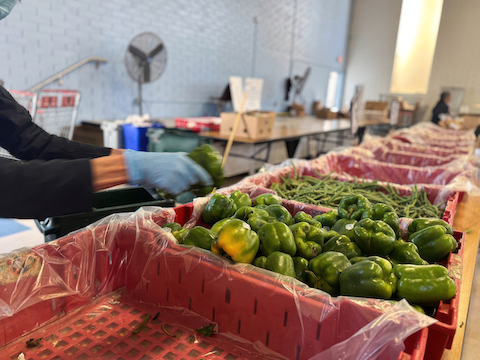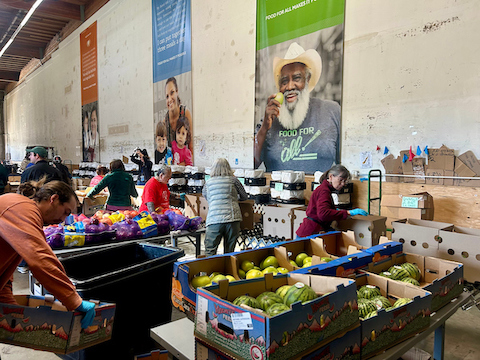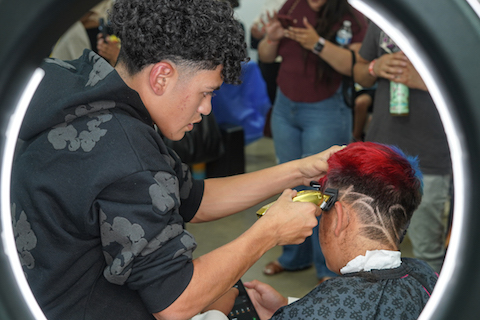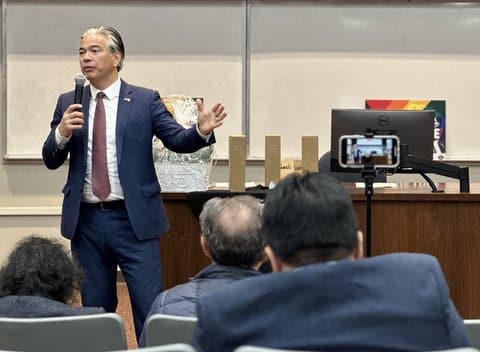
10 Nov Attorneys General Fight Federal Attempts to Claw Back Food Benefits

Volunteers restock produce at St. Anthony’s Padua Dining Room in Menlo Park on Nov. 1. (Claire Barber / Peninsula Press via Bay City News)
By Ruth Dusseault
Bay City News
A weekend back-and-forth court battle over whether the Trump administration is required to fully fund the Supplemental Nutrition Assistance Program through November has escalated to the Supreme Court and left many states spinning with their legal guns drawn.
On Monday, while Congress debated a potential deal to open the government through January, California Attorney General Rob Bonta co-led a coalition of 23 attorneys general and three governors in filing a further motion for a temporary restraining order in the U.S. District Court for the District of Massachusetts. The coalition urged the court to hold a hearing Monday because of the conflicting guidance issued by the U.S. Department of Agriculture.
According to Bonta, the USDA’s pattern of vague and contradictory guidance is growing by the day.
“The whiplash the president and USDA Secretary Brooke Rollins have given Americans in recent weeks, the steps they’ve taken to prevent vulnerable families from putting food on the table are unnecessary, unconscionable and unlawful,” Bonta said.
Bonta was joined in a press conference Monday by Minnesota Attorney General Keith Ellison, New York Attorney General Letitia James and New Jersey Attorney General Matt Platkin, as well as representatives from nonprofits that administer SNAP programs in New York.
The first lawsuits were fired off at the end of October when a coalition of attorneys general sued the Trump administration over the discontinuation of SNAP benefits in a federal court in the state of Massachusetts. A second coalition of cities and nonprofits filed a similar complaint in federal court in Rhode Island. Both courts found the SNAP suspension was unlawful and that USDA must use, at a minimum, more than $5 billion in SNAP contingency funds available to keep the program going, at least with partial or reduced payments. Partial payments gave states new complex benefit calculation tables that made it difficult to pay benefits and impossible to pay them quickly.
“The USDA has access to more than $20 billion in another account that it could use to fully fund the program for November, and it refused to touch those dollars,” Bonta said.
Then came a weekend of judicial gaveling.
On Thursday, the Rhode Island federal court ordered USDA to make full SNAP payments available by the next day. On Friday, Trump’s USDA filed an appeal against the Rhode Island decision with the First Circuit Court of Appeals, which denied a request for an administrative pause while the appeal was adjudicated. The USDA stated it would comply with the court order and issued guidance to the states to make full benefit payments available.
Relying on both the Rhode Island court order and USDA’s own guidance to go ahead, said Bonta, many states, including California, promptly began issuing benefits to recipients of SNAP, known in California as CalFresh.
The federal government asked the U.S. Supreme Court to stop the payments while the appeal was resolved, and late Friday night the Supreme Court issued an administrative stay, pausing Rhode Island’s court order to restart the program.
“I want to be really clear about what that means,” said Bonta. “The Trump administration went running to the highest court in the nation for permission to withhold food assistance for hungry Americans.”
On Saturday night, the Supreme Court issued a temporary stay, and the USDA reversed course. The agency issued a memo to states saying they must immediately undo any payments of SNAP benefits or face steep penalties.
“In short, they directed states to claw back food assistance that’s already gone to hungry Americans who’ve been waiting for it, counting on it to feed themselves and their loved ones,” said Bonta.
Late Sunday night, a federal judge in Massachusetts temporarily blocked the USDA’s directive to cancel benefits. The judge’s ruling means states are not required to comply with the USDA’s demand to undo the payments currently.
“Rhode Island’s court order still remains paused by the Supreme Court for the next roughly 36 hours,” Bonta said, adding that the coalition is asking the Massachusetts federal court to block the USDA’s directive to give back benefits and immediately make full SNAP benefits available.
New York Attorney General Letitia James said that the confusion has caused chaos. Some grocery stores in New York have refused to allow shoppers to use SNAP benefits.
“My office immediately sent cease and desist letters to grocery stores that reportedly engaged in this illegal behavior, and we put out a consumer alert letting New Yorkers know that this denial was unlawful and telling them how to respond,” James said.
“We are witnessing the restructuring of government through the illegal, unlawful and unconstitutional executive orders,” she said. “We are seeing power amassed in the hands of the executive. We are witnessing a callous and cruel and chaotic government.”
As of Monday, the USDA has confirmed with the Supreme Court that it still intends to push to try and keep SNAP benefits frozen amid the shutdown. The high court is expected to rule Tuesday whether to override the lower courts.
Copyright © 2025 Bay City News, Inc. All rights reserved. Republication, rebroadcast or redistribution without the express written consent of Bay City News, Inc. is prohibited. Bay City News is a 24/7 news service covering the greater Bay Area.






No Comments